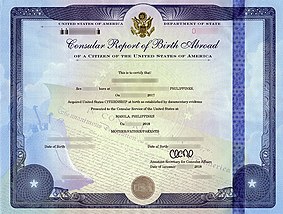United States nationality law details the conditions in which a person holds United States nationality. In the United States, nationality is typically obtained through provisions in the U.S. Constitution, various laws, and international agreements. Citizenship is a right, not a privilege. While the domestic documents often use citizenship and nationality interchangeably, nationality refers to the legal means in which a person obtains a national identity and formal membership in a nation and citizenship refers to the relationship held by nationals who are also citizens. Individuals born in any of the 50 U.S. states, the District of Columbia or almost any inhabited territory are natural-born United States citizens. The sole exception is American Samoa, where individuals are typically non-citizen U.S. nationals at birth. Foreign nationals living in any state or qualified territory may naturalize after becoming permanent residents and meeting a residence requirement (normally five years). From Wikipedia








